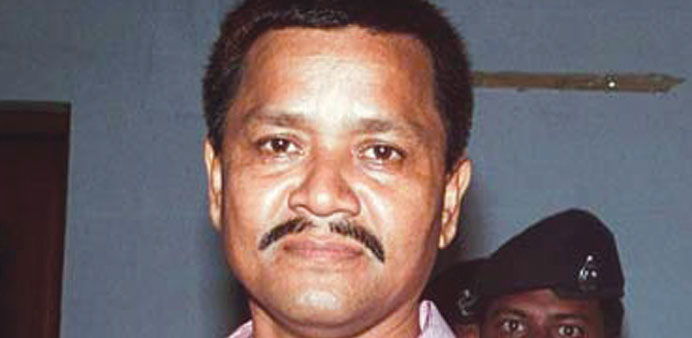Agencies/New Delhi
Bangladesh yesterday handed over a top separatist leader to India, officials on both sides said, after the two countries spent almost two decades arguing over his extradition.
Anup Chetia, founder of the separatist United Liberation Front of Asom group, was arrested in 1997 and sentenced to seven years in jail in Bangladesh for illegally being in the country.
But Chetia, whose group fought Indian rule of northeast Assam state bordering Bangladesh, spent 11 more years in custody while officials struggled to agree on terms to return him.
In a tweet yesterday, Prime Minister Narendra Modi said he spoke with his Bangladeshi counterpart Sheikh Hasina about Chetia, thanking her “for the help in fighting terrorism.”
Chetia is wanted in India for alleged killings, abductions and extortion during his group’s struggle in Assam.
Bangladesh Rifles handed over Chetia to the Border Security Force (BSF) at Dawki in Meghalaya around 2am yesterday, a senior official said.
Dawki is a border trade centre between India and Bangladesh.
“The Central Bureau of Investigation will take custody of Chetia. He is being flown to New Delhi and will have to face trial in India for various crimes committed by him in Assam which include murder, kidnapping and extortion,” the official said.
According to Indian media reports, New Delhi had long sought his repatriation but successive governments in Dhaka refused.
Bangladeshi Home Minister Asaduzzaman Khan said that Chetia’s extradition was long delayed as “he did not want to go at that time. He is released (now) according to his wish.”
Khan told reporters that as well as Chetia, ULFA leaders Laxmiprasad Goswami and Babul Sharma had also been handed over.
Dhaka spent years dealing with Chetia’s requests for political asylum in Bangladesh, according to the Press Trust of India news agency.
“I welcome the handing over of Anoop Chetia to India by the Bangladesh government,” Home Minister Rajnath Singh said on Twitter.
Minister of State for Home Affairs Kiren Rijiju said Chetia’s deportation would help crack many cases related to the banned outfit.
“Handing over of Anup Chetia by Bangladesh to India is a major breakthrough. Chetia is a top leader of ULFA and his handing over will lead to cracking of many cases. The central agencies and the Assam police will investigate him,” Rijiju said in New Delhi.
Chetia’s handover comes at a time of improved ties between India and Bangladesh as well as the signing of an extradition treaty between the two countries in 2013.
Earlier this year, the neighbours sealed a decades-long border dispute following Modi’s visit to Bangladesh.
Chetia was reported to be living in Bangladesh ever since he fled India in the early 1990s after he was released from an Indian jail in 1991.
Chetia is the second fugitive brought to India this month after Indonesia handed over wanted gangster Rajendra Sadashiv Nikalje, also known as Chhota Rajan, on Friday.
Chetia founded the ULFA in 1979 with five other leaders, including the outfit’s commander-in-chief Paresh Baruah who is now believed to be hiding somewhere in China or Myanmar, after escaping from Bangladesh.
ULFA, which started an armed independence struggle against Indian rule in 1979, declared a unilateral ceasefire in 2011, paving the way for a peace accord between the Indian government and the rebel group.
One of the largest rebel groups, ULFA accused New Delhi of exploiting the region’s natural resources.
But following the deal the group scaled down its demands and is now seeking an autonomous ethnic region under Indian rule.
More than 10,000 people, mostly civilians, have lost their lives to insurgency in Assam during the past two decades.

